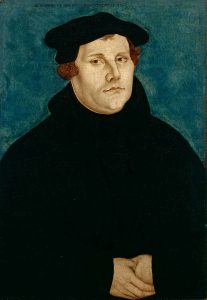Humanism
 Despite being a subject that means so much to such a diverse array of people, Humanism is often difficult to define. Much of its meaning depends on who is speaking about it at a given time. To the people of Western Europe during the Protestant Reformation, one of the eras with which Humanism is most frequently associated, it meant a shift in ideals away from the often oppressive Catholic Church and into personal development and community betterment. While the term wasn’t invented until 1808 when scholars began to use it to refer to the Renaissance fascination with the ancient world, various academics have since traced the roots of the ideals of the movement to various different eras of history including Ancient Greece and Dynastic China. However the era of the Protestant Reformation remains one of the most important moments for the idea.
Despite being a subject that means so much to such a diverse array of people, Humanism is often difficult to define. Much of its meaning depends on who is speaking about it at a given time. To the people of Western Europe during the Protestant Reformation, one of the eras with which Humanism is most frequently associated, it meant a shift in ideals away from the often oppressive Catholic Church and into personal development and community betterment. While the term wasn’t invented until 1808 when scholars began to use it to refer to the Renaissance fascination with the ancient world, various academics have since traced the roots of the ideals of the movement to various different eras of history including Ancient Greece and Dynastic China. However the era of the Protestant Reformation remains one of the most important moments for the idea.
The first spark in the rise of humanism was likely brought about by the 13th century Florentine Chancellor, Brunetto Latini, who as a politician argued against feudalism and papal authority and instead worked to promote civil liberties and civic duty among his people. Brunetto’s teachings would eventually go on to influence his fellow Florentine Dante Alighieri, whose writings would go on to have a wide impact throughout the entire Western World. From there the ideas of humanism entered broad discussion throughout Europe, even if scholars such as Boccaccio and Petrarch ensured it was still most frequently associated with the Italian peninsula.
It was in 1515 that Humanism became associated with the Reformation, a movement from within Christianity that saw a large body of Christians break away from the Catholic Church. In that year, Erasmus of Rotterdam published the New Testament in the original Greek text, and many took note of how much the book disagreed with modern church practices. Martin Luther, whose split with the Church is often the Reformation’s most crucial moment, shared many ideas with Erasmus, though they did split on whether or not humans had the capacity to adequately follow God’s will on their own. Erasmus would later condemn Luther when the latter made broke off from the Catholic Church, for he felt that the papal body was an essential component of the European world. But whatever schisms were felt among thinkers, there was no going back, for humanism as a movement was now followed by a greater audience than its founders could likely have imagined.
Ultimately, the legacy of humanism in the Reformation is one of independence and free thought. Its teachings led people to take an objective glance at the Catholic Church for the first time, and without its lessons, the Reformation probably would not have spread to the extent that it did. And while the humanism is mostly spoken of within a religious context, it would be shortsighted to say that its only impact was church related. Humanism taught themes of self-worth, independence, and critical thought to millions of people who had typically only subscribed to the views handed down to them by higher powers. Humanism ushered in an era of change, and much of the Renaissance, from which we gain so many of our modern ideals, would have been irreparably altered or nonexistent if not for this way of thought. The applications of this way of thinking are beyond measure, and are always worthy of study by inquisitive minds.
Works Cited
Bruenig, Elizabeth. “Martin Luther’s Revolution.” The Nation, 11 July 2017, www.thenation.com/article/martin-luthers-revolution/.
“Definition of ‘Humanism’ – English Dictionary.” Humanism Definition in the Cambridge English Dictionary, Cambridge Dictionary, dictionary.cambridge.org/us/dictionary/english/humanism?fallbackFrom=british-grammar.
“History of Humanism.” Religious Literacy Project, Harvard University, rlp.hds.harvard.edu/history-humanism.
“Humanism.” Humanism – By Branch / Doctrine – The Basics of Philosophy, www.philosophybasics.com/branch_humanism.html
“Humanism and the Reformation.” Muse Virtuel Du Protestantisme, Virtual Museum of Protestantism, www.museeprotestant.org/en/notice/humanism-and-the-reformation/.
“Humanism – Some History | Humanism.” Humanism – Inclusive Humanism, humanism.ws/the-editor/a-history-of-humanism-robert-grudin/